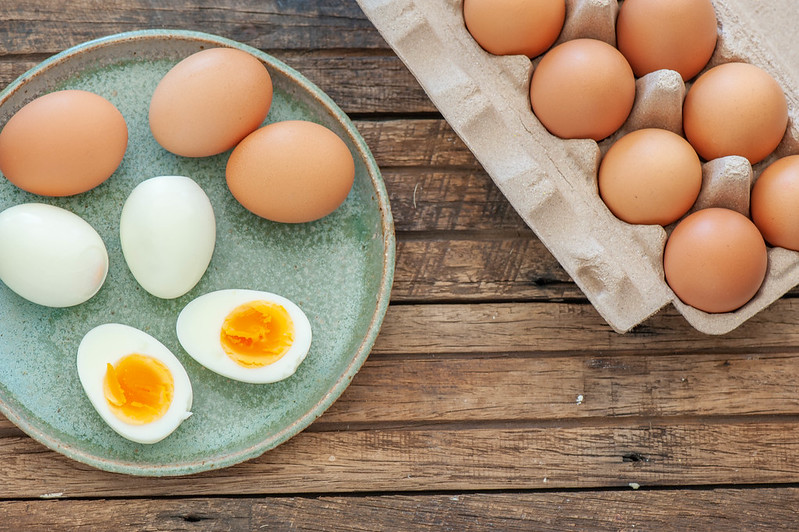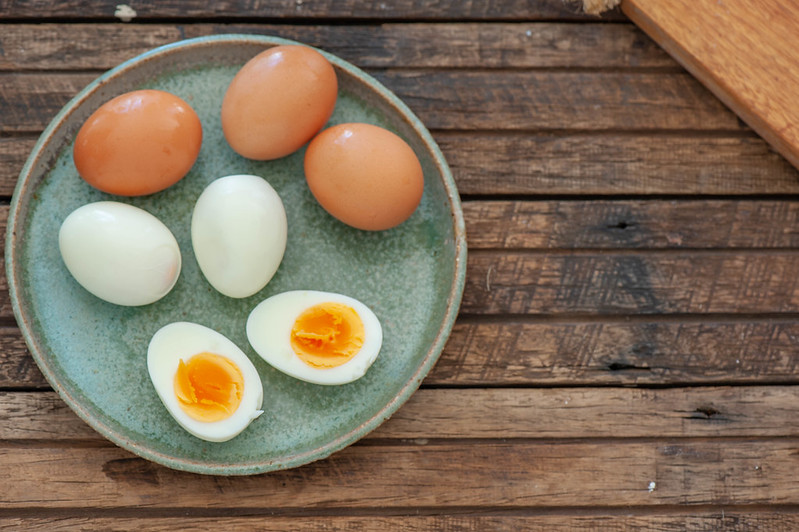
So this is pretty embarrassing but since we’re all friends here, I’ll come clean.
Over 10 years ago my brother asked me one of the great philosophical questions of all time… Why are some boiled eggs so difficult to peel?
And so I set out to figure it out. Which I did and then proceeded to write a blog post about it. Which got picked up by a little search engine known as Google.
Anyway time went by and I perfected my technique for poaching eggs. Which became my default. And I forgot about my egg-peeling wisdom.
Then this year I was looking for ideas to make getting breakfast ready for the boys easier for my Irishman and boiled eggs were back on the agenda.
So I started boiling up big batches on the weekend. Only to become completely frustrated when I had problems in the peeling department.
This went on for months. I’d experiment with one method or technique or another and nothing seemed to give consistent results.
And in frustration I turned to our old pal Google.. and whose blog post popped up first? You guessed it.
Luckily I was curious enough to read what my former self had written. And there it was… the step I had been missing… once the shells are cracked all over, roll the eggs between your hands.
Needless to say it worked.
And here we are.
Although I will say one thing in my defense, this method is better and more simple than the original.
Rather than putting the eggs in the pot and waiting for them to boil before starting the timer, I steam them instead. This gives a less rubbery texture but more importantly, you can set the timer as soon as the eggs are in the pot – so much less vigilance is required.

Reliable Boiled Eggs
Ingredients
- 6 eggs at room temperature
Instructions
- Bring 1cm (1/2in) water to the boil in a medium saucepan.
- Place eggs in a strainer / sieve that will fit inside your saucepan without the bottom touching the water in the pot.
- Lower strainer with eggs into the saucepan so it is resting on top. Allow the steam to come through for a few seconds. Cover the surface of the strainer and pot with foil and clamp on the lid.
- Set your timer for 11 minutes and leave the eggs to steam happily. Fill a bowl of cold water in the sink.
- When the timer goes, lift the strainer of eggs off the pot and carefully tip them into the prepared bowl. Turn on the cold tap and let the eggs cool for a minute or so.
- When the are cool enough to touch, taking one egg at a time, bash the shell on the surface of the sink so that the whole surface of the egg is cracked.
- Roll the egg between your hands. Don't skip this step - the rolling motion moves air from the air sack to loosen the space between the surface of the white and the membrane. This makes it exponentially easier to peel.
- Starting at the base of the egg, peel the shell away. It should start to come off easily. If not, just roll again and then try peeling again.
- NOTE: Occasionally even when I've followed all the instructions, I get a difficult egg that comes out all pock marked. But then the next one will be perfect. I just take it as a sign that the universe is testing me to remember it doesn't matter if some eggs aren't perfectly smooth - they still taste the same.
- Repeat with remaining eggs.
Variations & Substitutions
fridge cold eggs – just allow an extra minute to cook AND be prepared for them to be more difficult to peel.
short on time – poach your eggs instead.
super fresh eggs – conventional wisdom says you should use older eggs for boiling and fresher ones for poaching. And while for the latter fresh makes a massive difference. For boiling it doesn’t matter. The only thing is older eggs tend to have the yolks less centred which may or may not be a problem for you.
different eggs – any eggs can be cooked with this method. You’ll just need to adjust the cooking time according to your preferences.
soft boiled eggs – set the timer for 7-8 minutes.
Waste Avoidance Strategy
eggs – will keep in the fridge for weeks or use for another meal.
Problem Solving Guide
difficult to peel – see note above.
shells breaking – if you have older chickens with weaker shells (like I do) giving them ground up shells can help but my solution is to use my eggs from my older chickens for baking, omelettes and scrambling. And use my eggs from the farmers market (or my lovely neighbor Adela) for boiling.
no strainer – you can boil the traditional way instead – cover with cold water. Bring to the boil and simmer for 8 minutes from the time the water started boiling. Drain and follow the directions as per the method above.
Prepare Ahead
Yes! Just cook as per the recipe. Refrigerate either peeled or unpeeled in an airtight container. Will keep in the fridge for at least a week – sometimes longer.


 Add to my Old Favourite Recipes
Add to my Old Favourite Recipes


good to revive the issue…maybe remake the video…
Thanks Jules!
Refresh my memory Luke – what’s the issue with the video?
I have tried many methods of cooking eggs. When i joined joyful cooking last year I learnt a lot from Jules. One thing was to experiment. So I have tried normal boiling, air frying, pressure cooking and I must say Jules reliable eggs have been the most reliable so far.
So happy to hear that Rachel!
I have never done eggs like this before, it worked great!!
Thanks Jules 😊
Excellent Valerie!
Very cool! I never had problems peeling boiled eggs since I started pressure cooking them. Come to think about it- it’s just like very quick steaming.
YES! It’s speed steaming!
I learned how to do peelable eggs from the source of my eggs (Vital Farms, for those in the US). You can start with cold eggs, put them in cold water & bring the pot to a boil. Let simmer for 10 minutes or so. Then rinse the eggs in cold running water (I leave them in the pan, so the pan cools down, too), and then fill the pan with water and ice cubes. Once cooled, I tap both ends on the counter (bench), and roll the egg with a little pressure. It has worked for me every time, and at least for me, it’s way simpler than steaming them.
Thanks for sharing Susan! It’s the rolling that makes all the difference
I need to disagree with you about it just being the rolling, because I have always rolled my eggs and still had trouble peeling them. My thinking is that the rolling works better if the eggs have been cooled quickly with ice. As I understand it, fresher eggs tend to be more difficult to peel than older ones. That has been my experience in the past.
I’ll have to do some experiments with ice Susan 🙂